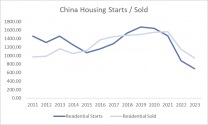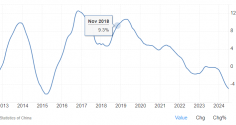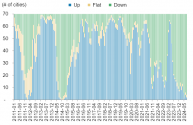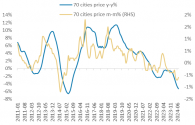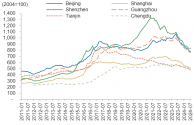Well things are still in the softer site BUT housing prices already leveling up, consumer price are heating, especially food and fast and from my experience industrial machinery prices is going up and I think is going to up faster in the coming years.Deflation is not just prices of things going down, but rather the *expectation* of future prices. When you believe things are going to get cheaper in the future, you defer consumption - why pay more now when you can get things for cheaper and better in the future? The fact that the country has been experiencing deflation in the longest period since 1998 (and soo to be longer), that changes the expectations/mentality of the average population. And this is where the Japan experience comes into play - wages in Japan started shrinking, hiring fell, etc.
For example, current housing starts/sales are already below the expected replacement + household formation + urbanization rates - meaning that people are deferring purchases. I.E this is already happening in housing.
White-label-ization is also happening in all the product categories: (You may very well believe that Wuliangye is a waste and that people shouldn't ever waste money on that, but newsflash, Yibin Government would go bankrupt if Wuliangye collapsed. This is before the obvious question of who died and made *your* values the be all end all *societal* values?)
So the entire policy mechanism needs to focus on preventing that from ever happening.
Whatever reforms they announced at the 3rd plenum needs to be accelerated and the central government needs to announce a 3-5 year fiscal package dedicated towards completing those reforms, with people actually feeling they are getting the benefits. Additionally, policy sequencing has to be improved - The narrative needs to shift towards how 'things are tough now but they will get better'.
Nobody is saying that China economy is "perfect", it has cycles of ups and downs all year around, it has been like that since the 80s in every single administration. The problem with Western Garbage Media is that they tend to take every single thing that happen, magnify the problem by 10 and tell a garbage story without any single context.As I've pointed countless times, the reason that Western propaganda is working is because reality on the ground is deteriorating. There is a reason why the Michael Pettis bullshit about the HSR being bad isn't sticking - its because people ride the damn trains and see how good they are. But guess what, this current economic pain is playing into the Western media messaging.
Like VC story from FT, do they tell you that company in the story is bound by a 2021 Chinese law about what information they can collect and disclosure <especially to foreigners>? Of course not because doesn't fit the agenda. Do they tell you that China Baking system is layered by the level of risk? No. Do they tell the stock market and the real economy are two different things? No.
I been there, when the 2007 stock bubble <biggest in China history>, China deepest housing bubble crash ever in the world in 2014-2015 and 5 trillion dollar losses in the 2015 bubble.
You are the one who lives in echo chamber and your efforts are better served in the twitter echo chamber.For all you people who are all busy harping on the future strength of the Chinese economy here, in the mother of all echo chambers, your efforts will be much better served on Chinese social media in Chinese.

